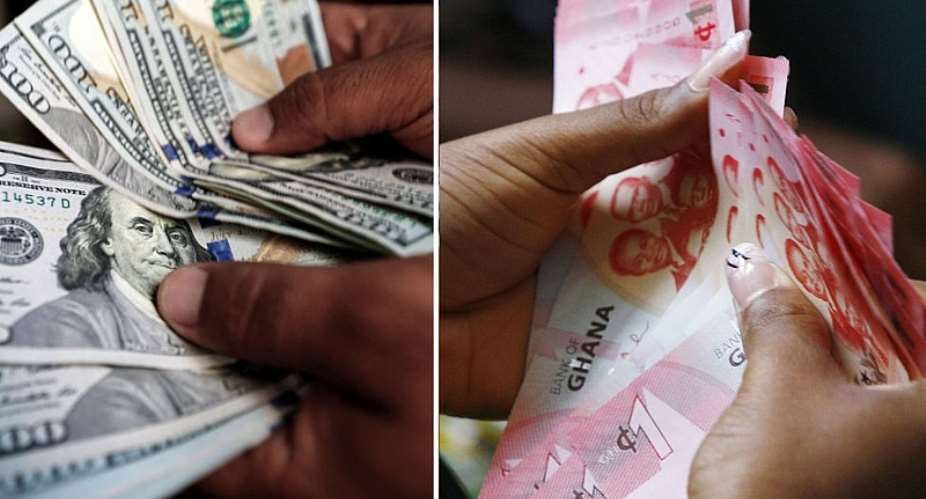As a country, if there's anything to joke about, it shouldn’t be the exchange rate. Not at all. The jokes we make about it show how little we consider it as a fiscal policy, and it reflects how abysmally the economy is managed.
In the early 2010s, the cedi had a value — ₵8,020 would exchange into $8,000. It maintained a similar rate throughout 2011-2012, meaning duties on importation were fairly moderate for car dealers and others in the importation and exportation business. Even in 2016, when it was ₵4.4 to $1, lives were not badly affected.
But for the past three years, from 2021 up to date, the exchange rate has risen to inconsiderate figures. One would be forced to think that someone somewhere was manipulating the figures to keep hiking. Today, one dollar ($1) is twelve and fifty pesewa (₵12.5). The iPhone 15 is priced at $700, which should exchange into ₵700, but it’s a whopping ₵8,750. How can this be explained to make sense without resorting to magic?
Just in 2019, ₵11,000 would buy eight units of 1.5HP air conditioners. Nothing has changed. The same amount of money today will only buy two units of 1.5HP air conditioners. This is the economics the average Ghanaian understands: the effect of the exchange rate on food, clothing, rent, housing, market price of appliances, etc. that the price of kenkey will not hike from ₵0.50 to ₵3-5. If it’s the time value of money or depreciation of the cedi, we are still disillusioned.
Should a new nurse in the UK be paid £2000, and though we know the UK has better conditions of service and systems, which make it luxurious to live there, an average Ghanaian nurse who may be earning a net of ₵2000, where the exchange rate is ₵1 to £1, will think twice before leaving the shores of Ghana for the UK. The same could be said for those who take life-threatening routes from Ghana to Nicaragua, then to Mexico or America, if the exchange rate were better. We are losing our teeming youth and better minds to Europe due to economic slave trade.
There’s a high rise in goods and services, inflation, and devaluation of the cedi, which keep breaking the economy, regardless of its decline from 54% to 23%. If we dwell too much on macroeconomic rants which don’t translate into adding value to our pockets, we are doing ourselves a disservice.
If the exchange rate is good, we can sit at the comfort of our homes and enjoy good economies of scale without risking our lives. And nobody will buy a car and have to pay triple times the cost of the car for shipping costs and duty. Businesses won’t fold up. The private sector will be vibrant.
Before we could think about clapping for ourselves anytime the cedi appreciates by a slight margin, and thus reduced it to a cacophonous political comparison rather than striving for industrialization (adding value to exports, increasing local production, and cutting down on imports), raising domestic revenue (property tax, tax exemptions, and natural resources) to service public debts without hefty reliance on borrowing, implementing good monetary policies (interest rate band and hedging), helping private sector financing, and allowing them to invest in the economy, then we are shameless.
Politics of comparison is the thief of political honesty, accountability, transparency, and the birth of abysmally political performance in the 21st century. It’s a lose-lose for us that we have leaders who see win in losses because their loss is slightly below the loss of their opponents.





 We saved $57.9million from procurement of new verification devices, registration...
We saved $57.9million from procurement of new verification devices, registration...
 Ejisu by-election: Aduomi is a betrayer – Ahiagbah
Ejisu by-election: Aduomi is a betrayer – Ahiagbah
 Dumsor: I’ll be in police custody if I speak, I vex — DKB
Dumsor: I’ll be in police custody if I speak, I vex — DKB
 We'll give daily evidence of Akufo-Addo's supervised thievery from our next gene...
We'll give daily evidence of Akufo-Addo's supervised thievery from our next gene...
 Asiedu Nketia crying because they've shared the positions and left him and his p...
Asiedu Nketia crying because they've shared the positions and left him and his p...
 Mahama's agenda in his next 4-year term will be 'loot and share' — Koku Anyidoho
Mahama's agenda in his next 4-year term will be 'loot and share' — Koku Anyidoho
 If you're president and you can't take care of your wife then you're not worth y...
If you're president and you can't take care of your wife then you're not worth y...
 Foreign Ministry caution Ghanaians against traveling to Northern Mali
Foreign Ministry caution Ghanaians against traveling to Northern Mali
 GHS warns public against misuse of naphthalene balls, it causes newborn jaundice
GHS warns public against misuse of naphthalene balls, it causes newborn jaundice
 Our education style contributes to unemployment - High Skies College President
Our education style contributes to unemployment - High Skies College President
